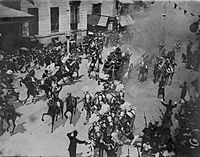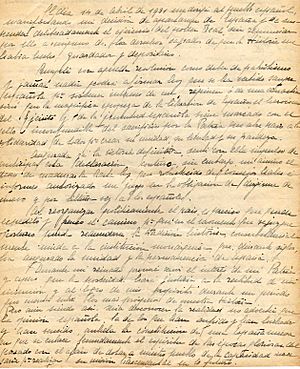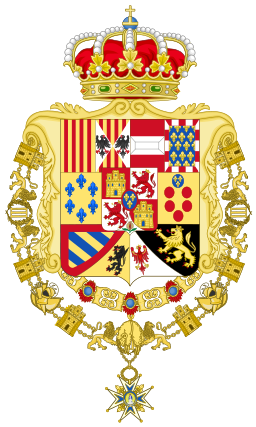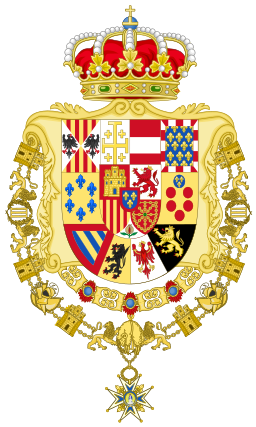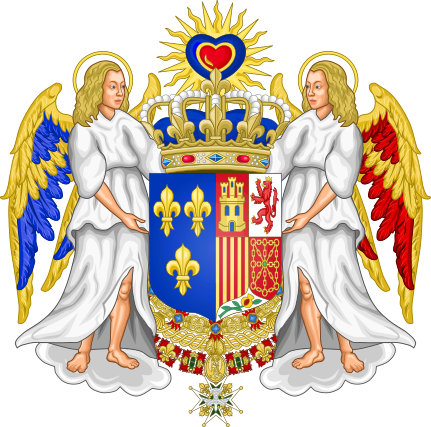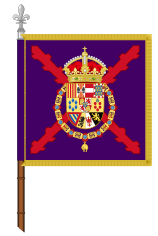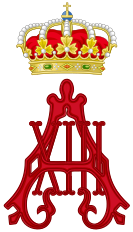Alfonso XIII facts for kids
Quick facts for kids Alfonso XIII |
|||||
|---|---|---|---|---|---|
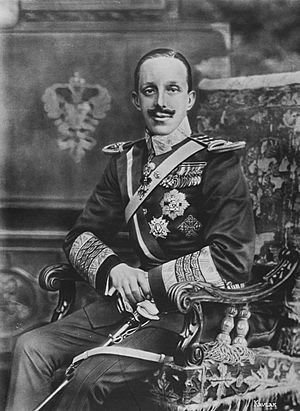
Photograph by Kaulak, 1916
|
|||||
| King of Spain (more...) | |||||
| Reign | 17 May 1886 – 14 April 1931 | ||||
| Enthronement | 17 May 1902 | ||||
| Predecessor | Alfonso XII | ||||
| Successor | Niceto Alcalá-Zamora (as President of Spain) |
||||
| Regent | Maria Christina (1886–1902) | ||||
| Born | 17 May 1886 Royal Palace of Madrid, Madrid, Kingdom of Spain |
||||
| Died | 28 February 1941 (aged 54) Rome, Kingdom of Italy |
||||
| Burial | El Escorial | ||||
| Spouse | |||||
| Issue more... |
|
||||
|
|||||
| House | Bourbon-Anjou | ||||
| Father | Alfonso XII of Spain | ||||
| Mother | Maria Christina of Austria | ||||
| Religion | Catholicism | ||||
| Signature | |||||
Alfonso XIII (born 17 May 1886 – died 28 February 1941) was the King of Spain from the day he was born until 14 April 1931. He became king at birth because his father, Alfonso XII, had passed away the year before. His mother, Maria Christina of Austria, acted as regent, meaning she ruled for him, until he turned 16 in 1902.
Alfonso XIII was often seen as a "soldier-king" because of his strong connection to the military. His rule began after Spain lost its colonies in the Spanish–American War in 1898. Like other kings at the time, he played a big role in politics. His wedding in 1906 to Victoria Eugenie of Battenberg had a bomb attack, but they were not hurt.
During World War I, Alfonso XIII used his family ties to other European royal families to help Spain stay neutral. However, his rule faced many challenges, including problems in Morocco and a military takeover in 1923 led by Miguel Primo de Rivera. Alfonso XIII supported this dictatorship.
When the dictatorship failed, Alfonso XIII removed his support from Primo de Rivera, who then resigned in 1930. But the king had lost much of his power. After local elections in April 1931, which were seen as a vote on whether to keep the monarchy, Alfonso XIII left Spain. The Second Spanish Republic was then declared on 14 April 1931.
His efforts to help prisoners during World War I earned him a nomination for the Nobel Peace Prize in 1917. He is the only monarch ever nominated for this award.
Contents
About King Alfonso XIII
Early Life and Education
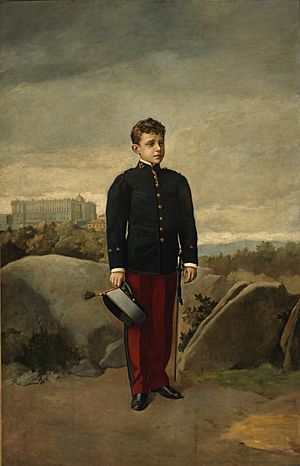
Alfonso XIII was born at the Royal Palace of Madrid on 17 May 1886. He was born after his father, King Alfonso XII, had died. This meant he became king the moment he was born. When he was just five days old, he was baptized with water brought from the River Jordan.
His mother, Maria Christina of Austria, was his regent until he turned 16. During this time, in 1898, Spain lost control of Cuba, Puerto Rico, Guam, and the Philippines to the United States after the Spanish–American War.
Alfonso became very sick during the 1889–1890 pandemic when he was young, but he recovered. When he turned 16 in May 1902, there were many celebrations across Spain. He promised to follow the constitution in front of the Cortes (Spain's parliament).
He received a military education, which made him feel very patriotic about Spain.
Engagement and Royal Marriage
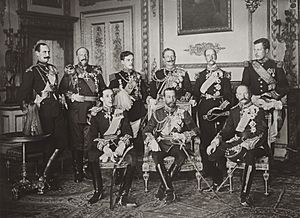
In 1905, Alfonso XIII started looking for a queen. During a visit to the United Kingdom, he met Princess Victoria Eugenie of Battenberg at Buckingham Palace. She was the granddaughter of Queen Victoria. Alfonso found her very appealing, and she liked him too.
There were a few challenges for their marriage. Victoria was Protestant and had to become Catholic. Also, her brother had haemophilia, a blood disorder, which meant Victoria might be a carrier. Alfonso's mother preferred him to marry a Catholic princess from her own family.
Victoria agreed to change her religion. Alfonso's mother eventually agreed to the marriage. In January 1906, they officially announced their engagement. Victoria converted to Catholicism in March.
Alfonso and Victoria were married in Madrid on 31 May 1906. Many British royals attended, including Victoria's cousins, the Prince and Princess of Wales. Their wedding day was marked by an assassination attempt. An anarchist threw a bomb, killing 30 people and injuring 100 others, but the royal couple was unharmed.
Their first child, Alfonso, was born on 10 May 1907. Victoria was indeed a carrier of haemophilia, and their son Alfonso inherited the condition. Another son, Gonzalo (1914–1934), also had haemophilia.
Spain During World War I
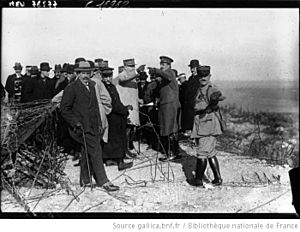
During World War I, Spain remained neutral. This was partly because King Alfonso XIII had family connections to both sides of the conflict. The King set up an office to help prisoners of war from all countries. This office used Spain's diplomats and military to send and receive letters for thousands of prisoners.
Alfonso tried to help the Russian Tsar Nicholas II and his family, who were captured by the Bolsheviks. He sent telegrams offering them a safe place in Spain. He later learned that the Romanov family had been killed.
Alfonso became very ill during the 1918 flu pandemic. Because Spain was neutral, news of his illness and recovery was reported openly. This led to the flu being mistakenly called "the Spanish Flu," as other countries hid their own outbreaks.
Challenges and Dictatorship
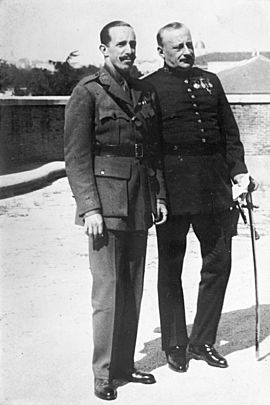
After World War I, Spain fought the Rif War (1920–1926) to keep control of northern Morocco. Many people in Spain thought this war was a waste of money and lives. Critics even called Alfonso el Africano ("the African") because of his support for the war.
Alfonso XIII supported generals who wanted Spain to gain new territories in Africa. One general he favored was Manuel Fernández Silvestre. In 1921, Silvestre led his troops into the Rif mountains in Morocco. Alfonso encouraged him not to retreat. This led to the Battle of Annual, one of Spain's worst military defeats.
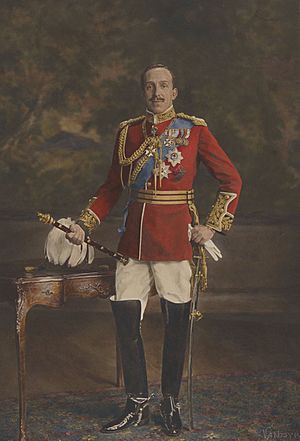
The Rif War continued to go badly for Spain. On 13 September 1923, General Miguel Primo de Rivera took control of the government in a military takeover. Alfonso XIII supported this, and Primo de Rivera ruled as a dictator with the king's backing until January 1930.
However, Primo de Rivera's government faced economic problems and became unpopular. In January 1930, he was forced to resign. Alfonso XIII then appointed General Dámaso Berenguer as the new prime minister. But the king was seen as too closely linked to the dictatorship, and it was hard for him to regain public trust.
Leaving the Throne and Exile
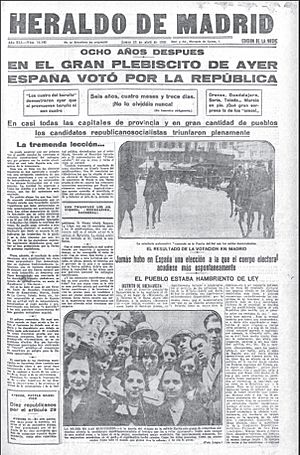
On 12 April 1931, local elections were held in Spain. These elections were widely seen as a vote on whether Spain should remain a monarchy or become a republic. The parties that wanted a republic won a large majority in major cities.
Because of these results, Alfonso XIII left the country. The Second Spanish Republic was then peacefully declared on 14 April 1931.
From his exile, Alfonso XIII was involved in some plans against the new Republic. In 1933, his two oldest sons, Alfonso and Jaime, gave up their claims to the Spanish throne. In 1934, his youngest son Gonzalo died. This left his third son, Juan, as his only male heir.
When the Spanish Civil War began in July 1936, Alfonso XIII made it clear he supported the side fighting against the Republican government. However, the leader of that side, Francisco Franco, later said he would not bring Alfonso back as king.
Death and Burial
On 15 January 1941, Alfonso XIII officially gave up his rights to the Spanish throne in favor of his son Juan. He died of a heart attack in Rome on 28 February of that year.
In Spain, the dictator Francisco Franco declared three days of national mourning. Alfonso XIII was first buried in Rome. In January 1980, his remains were moved to El Escorial in Spain, where many Spanish kings and queens are buried.
Alfonso XIII's Legacy
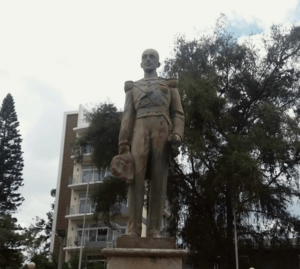
Alfonso XIII helped promote tourism in Spain. He supported the building of the luxurious Hotel Palace in Madrid to house his wedding guests. He also helped create a network of state-run hotels called Paradores in historic buildings.
He loved football (soccer) and supported several "royal" ("real" in Spanish) football clubs. The first was Real Club Deportivo de La Coruña in 1907. Other famous clubs he supported include Real Madrid, Real Sociedad, and Real Betis.
A street in Madrid, Avenida de Alfonso XIII, is named after him. There's also a street named Alphonso Street in Merthyr Tydfil, Wales, built for Spanish immigrants.
Alfonso XIII is also linked to the popular Spanish character Ratoncito Pérez, who is like the Tooth Fairy. This character first appeared in a story written for King Alfonso XIII when he lost a baby tooth at age eight. The king appeared in the story as "King Buby." Today, the tradition of Ratoncito Pérez replacing lost milk teeth with a small gift is followed in Spain and Latin America.
Personal Life and Family
His Children
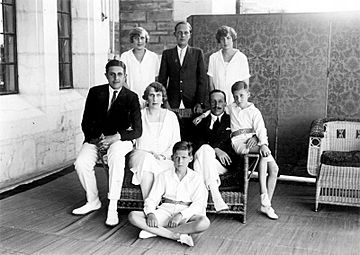
Alfonso XIII and his wife, Victoria Eugenie of Battenberg (also known as Ena), had seven children:
- Alfonso, Prince of Asturias (1907–1938)
- Infante Jaime, Duke of Segovia (1908–1975)
- Infanta Beatriz (1909–2002)
- Infante Fernando (born and died in 1910)
- Infanta María Cristina (1911–1996)
- Infante Juan, Count of Barcelona (1913–1993)
- Infante Gonzalo (1914–1934)
Alfonso also had other children. These included Roger Marie Vincent Philippe Lévêque de Vilmorin (1905–1980), Juana Alfonsa Milán y Quiñones de León (1916–2005), Anna María Teresa Ruiz y Moragas (1925–1965), Leandro Alfonso Luis Ruiz y Moragas (1929–2016), and Carmen Gravina (1926–2006).
Heraldry
- Heraldry of Alfonso XIII of Spain
-
Coat of arms of Alfonso XIII
(1886–1924/1931) -
Coat of arms of Alfonso XIII
(1924/1931)
Honours
Spanish Honours
- 1,072nd Knight of the Golden Fleece, 1886
- Grand Cross of the Order of Charles III, with Collar, 1886
- Grand Cross of the Order of Isabella the Catholic, with Collar, 1927
- Order of Santiago
- Order of Calatrava
- Order of Alcántara
- Order of Montesa
- Maestranza de caballería (Royal Cavalry Armory) of Ronda, Sevilla, Granada, Valencia and Zaragoza
- Founder of the Civil Order of Alfonso XII, 23 May 1902
- Founder of the Order of Civil Merit, 25 June 1926
Foreign Honours

 Austria-Hungary: Grand Cross of the Royal Hungarian Order of St. Stephen, 1900
Austria-Hungary: Grand Cross of the Royal Hungarian Order of St. Stephen, 1900 Belgium: Grand Cordon of the Order of Leopold, 1902
Belgium: Grand Cordon of the Order of Leopold, 1902 Czechoslovakia: Collar of the White Lion, 28 April 1925
Czechoslovakia: Collar of the White Lion, 28 April 1925 Denmark: Knight of the Elephant, 20 July 1901
Denmark: Knight of the Elephant, 20 July 1901 France: Grand Cross of the Legion of Honour, January 1903
France: Grand Cross of the Legion of Honour, January 1903 Kingdom of Prussia: Knight of the Black Eagle
Kingdom of Prussia: Knight of the Black Eagle Kingdom of Bavaria: Knight of St. Hubert, 1904
Kingdom of Bavaria: Knight of St. Hubert, 1904 Grand Duchy of Hesse: Grand Cross of the Ludwig Order, 23 August 1910
Grand Duchy of Hesse: Grand Cross of the Ludwig Order, 23 August 1910 Kingdom of Saxony: Knight of the Rue Crown
Kingdom of Saxony: Knight of the Rue Crown Württemberg: Grand Cross of the Württemberg Crown, 1890
Württemberg: Grand Cross of the Württemberg Crown, 1890 Kingdom of Italy: Knight of the Annunciation, 20 September 1900
Kingdom of Italy: Knight of the Annunciation, 20 September 1900 Sovereign Military Order of Malta: Bailiff Grand Cross of Honour and Devotion
Sovereign Military Order of Malta: Bailiff Grand Cross of Honour and Devotion Empire of Japan: Collar of the Order of the Chrysanthemum, 1930
Empire of Japan: Collar of the Order of the Chrysanthemum, 1930 Norway: Grand Cross of St. Olav, with Collar, 18 April 1911
Norway: Grand Cross of St. Olav, with Collar, 18 April 1911 Persian Empire: Order of the Aqdas, 1st Class, 16 May 1902
Persian Empire: Order of the Aqdas, 1st Class, 16 May 1902 Kingdom of Portugal: 315th Grand Cross of the Tower and Sword, 1900
Kingdom of Portugal: 315th Grand Cross of the Tower and Sword, 1900 Kingdom of Romania: Grand Cross of the Order of Carol I, with Collar, 1906
Kingdom of Romania: Grand Cross of the Order of Carol I, with Collar, 1906 Russian Empire: Knight of St. Andrew, 1902
Russian Empire: Knight of St. Andrew, 1902 Siam: Knight of the Order of the Royal House of Chakri, 18 October 1897
Siam: Knight of the Order of the Royal House of Chakri, 18 October 1897 Sweden: Knight of the Seraphim, 16 May 1902
Sweden: Knight of the Seraphim, 16 May 1902 United Kingdom:
United Kingdom:
- Honorary Grand Cross of the Royal Victorian Order, 28 July 1897
- Stranger Knight of the Garter, 16 May 1902
- Royal Victorian Chain, 9 June 1905
See Also
 In Spanish: Alfonso XIII de España para niños
In Spanish: Alfonso XIII de España para niños
- 1902 Copa de la Coronación
- List of covers of Time magazine (1920s), (1930s)
 | Delilah Pierce |
 | Gordon Parks |
 | Augusta Savage |
 | Charles Ethan Porter |


